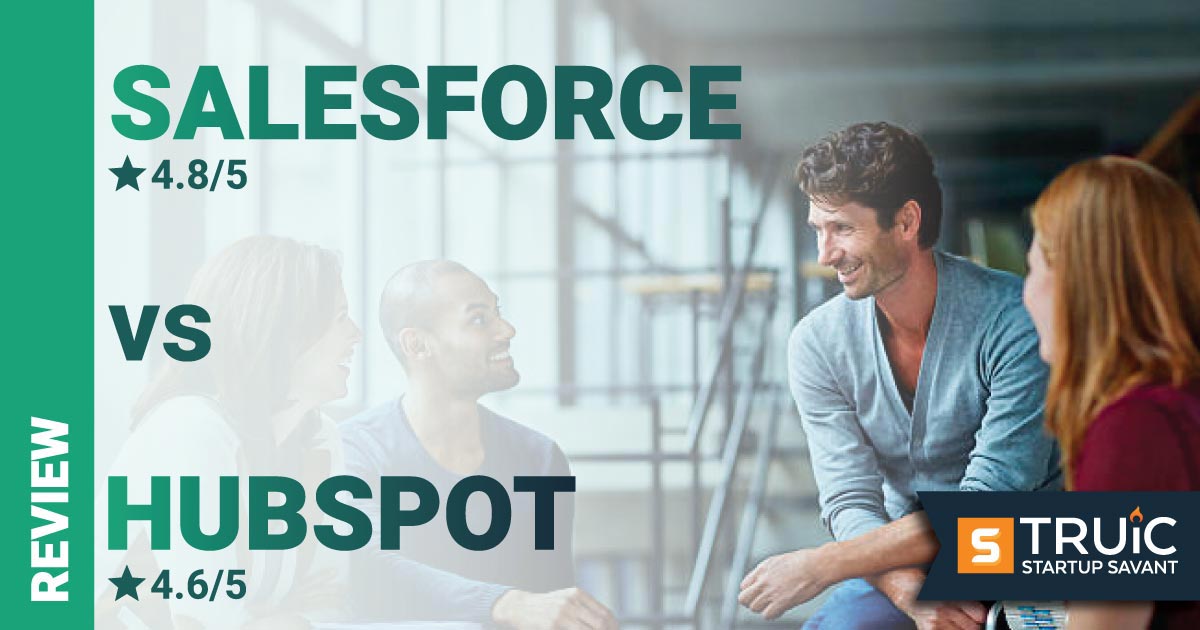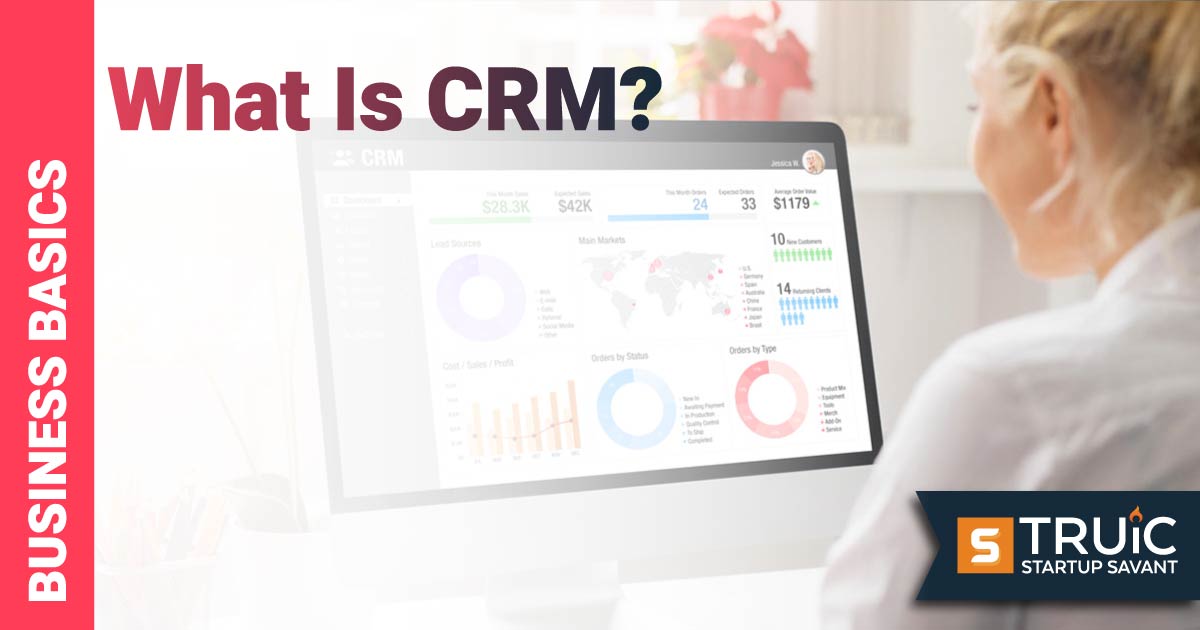HubSpot vs. Salesforce Comparison — Which Is the Best CRM in 2024?

Last Updated: By TRUiC Team
Salesforce and HubSpot both offer leading full-suite CRM tools that can optimize sales, lead generation, and contact management processes, plus loads of app extensions and customization capabilities. But the needs of a startup vary depending on size, stage, type of business, and customer base.
At the end of the day, there are different types of businesses that would benefit from either software, but there is only one that is more capable overall. While both Salesforce and HubSpot offer excellent comparable features, there are differences, and knowing these can help you decide which is the best CRM software for your startup.
Read on to find out which is the best CRM software and how it could work for your startup as we compare HubSpot vs. Salesforce.
Find out which is the best CRM software in 2024 and how it could work for your startup as we compare HubSpot vs. Salesforce.
Best CRM for Startups: Salesforce
HubSpot vs. Salesforce: What Sets Them Apart
Pricing
HubSpot beats out Salesforce in the free category with a relatively comprehensive, no-cost version that provides email and lead tracking, basic reports, some pipeline management, and live chat tools. Both HubSpot and Salesforce offer a variety of paid plans, each building on the features of the last, but while you will find lower pricing with HubSpot, Salesforce offers richer features at only slightly higher price points, plus a fourth Unlimited plan with top-tier customer service and advanced AI capabilities.
With both HubSpot and Salesforce, you'll also have the option of boosting your capabilities by adding additional, comprehensive software modules, such as Marketing or Customer Service, but be mindful, as with either plan, the extras can add up.
Features
Salesforce takes itself a bit more seriously with robust customization, advanced reporting, data, and lead management tools that amount to a more feature-rich overall CRM than HubSpot. With AI-driven marketing tools, rich mobile and forecasting capabilities and tons of extensions, such as the ability to track and reduce your startup’s carbon footprint, Salesforce provides sophisticated features that even a complex enterprise could benefit from.
Meanwhile, HubSpot includes more marketing features with its plans, but to access advanced sales reporting capabilities and team management features, you’ll need a higher-tiered paid plan.
Ease of Use
HubSpot has a simple, contemporary interface with capable dashboards and a step-by-step onboarding process that puts it ahead of Salesforce but at a price. While Salesforce also offers a user-friendly platform, it has a more serious business look and users may find it requires a bit more time to set up.
But the reason Salesforce can be a bit more involved to use is that it delivers a more customizable experience capable of managing more complexity. So, in this case, it’s important to consider the skills of your team members and your startup's growth trajectory to decide whether ease of use or richer capabilities would be of greater benefit to your business goals.
Customer Support
Both HubSpot and Salesforce offer a wealth of self-service options. After that, HubSpot adds email and live in-app support with its entry-level paid plan, then phone support with its two highest-level plans. Salesforce has phone support for all users but only in the case of a business stoppage issue, and otherwise provides phone support only to users who pay for one of its support plans. Other users can access online chat once logged into their account, so while the two offer comparable levels of support, Salesforce users report higher satisfaction with Salesforce support solutions.
HubSpot vs. Salesforce: Similarities
Reporting & Analytics
While HubSpot is a respected CRM used by many larger businesses, Salesforce provides granular-level data and more complex reporting possibilities. With Salesforce, even large enterprise businesses can easily view the entire sales pipeline, including forecasted revenue, missed revenue from leads, cross filters, joined reports, and detailed performance analytics alongside quote and order tracking. With its Professional plan, HubSpot offers custom reporting, forecasting and useful dashboards with marketing and pipeline management analytics, but overall, it lacks the complex capabilities and data flexibility of Salesforce.
Customization
Salesforce and HubSpot both include industry-leading customization capabilities with their paid plans, including drag-and-drop layout editors, custom objects and processes, custom field and email personalization. But at the end of the day, Salesforce provides the most generous CRM customization experience available with sales path customization, custom opportunity fields and splits, custom automated processes, and more. You can even use a drag-and-drop editor to visually build custom apps on its Lightning App platform, while advanced users can edit any Salesforce code.
Integrations
When it comes to integration possibilities that can scale alongside any startup, Salesforce can’t be beaten. Its AppExchange is the most extensive CRM app marketplace available with over 4,500 offerings, many of which have been built on the Salesforce platform for incredible ease of integration. Compared with smaller CRM platforms, HubSpot’s AppEcosystem has some impressive integration capabilities with its 150+ native apps and 1,000+ total extension possibilities, but it falls quite a bit short of Salesforce’s wide-ranging app and add-on offerings.
Self-Service Support
Both HubSpot and Salesforce provide a considerable array of online resources to help support new and experienced users. Through its Resource Center, Salesforce users can find helpful tools, including webinars, videos, guides, a customer community, and articles organized by role, industry type, or topic. Meanwhile, HubSpot users can join the HubSpot Community to access webinars, videos, and community groups. While both offer great resources, Salesforce, as the more established business, offers a wider selection of support resources
Best CRM Overall: Salesforce
We recommend Salesforce CRM for startups because of its large number of features and easy-to-use platform.
HubSpot vs. Salesforce: Customer Reviews
Salesforce is used by entrepreneurs who:
- Need CRM software that can scale alongside a startup
- Would benefit from strong sales management and reporting tools
- Want strong mobile capabilities
- Have complex sales needs
Here are some verified Salesforce reviews (from TrustRadius) by customers who used this formation service to help launch their business:
“I used Salesforce to help organize cold/warm leads with data points attached to each including notes, timestamps, and attachments. Salesforce also helped me manage my opportunities in a very organized way, dependent on where they were in the sales cycle, deal size, next steps, etc. Another important aspect of Salesforce was that it helped me improve forecasting accuracy, so that I could properly track my personal pipeline to reach my sales goals. One of the business problems we had was reaching customers at a mass scale, so with Salesforce, we could actually send out mass emails to bring in more leads, touch base with our customers, and/or educate companies on the climate of the industry. The mass emails could even be personalized, making our potential leads and customers more attracted to opening our emails.”
"The main goal of Salesforce is to follow business pipeline. In our setting, we have declared companies, contacts, opportunities, and requests. The tool is efficient to get access to information on the web or mobile at any time. It is excellent to track business opportunities and link them to an account in order to be able to reverse engineering a customer organization and be able to maximize our customer's satisfaction. It is helpful to monitor tasks and has a follow-up of actions. The main issue we are solving is tracking business opportunities and having a business review that allows us to have a better understanding of our market footprint.”
“We have been using Salesforce.com as our main CRM now for over a year and it has streamlined the way we communicate with each other. Having our team based in different states it gives us one central point of contact and allows us to constantly know where all our clients files are at and track our conversions/sales.”
HubSpot is used by entrepreneurs who:
- Need free CRM software with overall functionality
- Have strong inbound marketing needs
- Run a small or midsize startup with a modest growth trajectory
- Seek a user-friendly CRM with capable but less advanced abilities
Here are some verified HubSpot reviews (from TrustRadius) by customers who used this formation service to help launch their business:
"We've used Hubspot for well over 5-6 years, so it's a little difficult for me to compare, but Hubspot is one of the market leaders, so the range of other software we use that integrates with Hubspot is vast. This is of great benefit to us as it doesn't require any dev support if we want to integrate data into the platform or push/pull data into another platform from Hubspot. The customization available within Hubspot is extremely comprehensive, too - there's not been a scenario yet where Hubspot hasn't met our needs."
"Hubspot is a great platform for two different kinds of businesses in my opinion: solopreneurs who need a place to store customer data and notes along with a basic sales pipeline to track sales; and enterprise-level accounts. Why such a breadth? To get meaningful automation with Hubspot cost upwards of $800/month, which is simply not accessible to SMBs. However, they offer a generous free plan, and if you don't need automation, it's a great CRM."
"Suited for lean startups and companies that are looking to create two way flow of communication with their prospects. Definitely recommended for inside sales! Not recommended for larger companies with much bigger teams where the deals have to be handed over from one rep to another. Definitely needs improvements with insights and a few more integrations with other CRM tools would be fantastic!"
HubSpot vs. Salesforce: Pricing and Features
HubSpot and Salesforce both offer leading, popular CRM tools, but as we’ve discussed, there are some differences in features and pricing plans. For example, HubSpot offers a free plan whereas Salesforce includes more advanced features with lower-tiered paid plans. To see how pricing and features stack up, let’s take a look at all the plans and top features offered by these CRM competitors.
HubSpot CRM Packages
Free Sales/CRM Tools
Notable Features:
- Contact management
- Deal Pipeline
- Quotes
- Meeting scheduling
- Live chat
- Reporting dashboard
Sales Hub Starter (Starts at $45/Month)
Notable Features:
- Everything in the Free plan
- Simple automation
- Goals
- Conversion routing
- Multiple currencies
- Rep productivity performance
Sales Hub Professional (Starts at $450/Month)
Notable Features:
- Everything in Starter
- Deal stage, task, and lead rotation automation
- Sequences
- Teams
- Custom reporting
- Phone support
Sales Hub Enterprise (Starts at $1,200/Month)
Notable Features:
- Everything in Professional
- Custom objects
- Predictive lead scoring
- Playbooks
- Forecasting
- Recurring revenue tracking
Salesforce CRM Packages
Essentials ($25/User/Month)
Notable Features:
- Customizable reports and dashboard
- Contact and lead management
- Email integration and campaigns
- Web-to-lead capture
- Mobile app
Professional ($75/User/Month)
Notable Features:
- Pipeline management
- Forecasting mobile app
- Sales orders and quotes
- Contracts
- Developer sandbox
Enterprise ($150/User/Month)
Notable Features:
- Advanced reporting
- Workflow automations
- Web services API
- In-platform app building
- Opportunity scoring
Unlimited ($300/User/Month)
Notable Features:
- Sales engagement and insights
- Premier customer success plan
- 24/7 priority support
- Custom-tailored guidance
- Expert coaching
HubSpot vs. Salesforce: The Bottom Line
Salesforce and HubSpot both offer compelling, widely-used CRM software products, but to decide which is the best CRM software for your startup, you’ll want to consider not only your startup's needs today but where you plan to be in the next three to five years. If you’re on a tight budget, have more marketing than sales management needs, and anticipate modest growth, HubSpot’s free option may be appealing for your needs.
But if you are an early-stage startup with growth plans or a more established startup with more complex sales management needs, Salesforce may be the best option to meet your business needs today and in the future. While both have the capabilities to serve the needs of many small and medium-sized startups, when all factors are considered, Salesforce emerges as the best CRM software on the market for most startup businesses.


